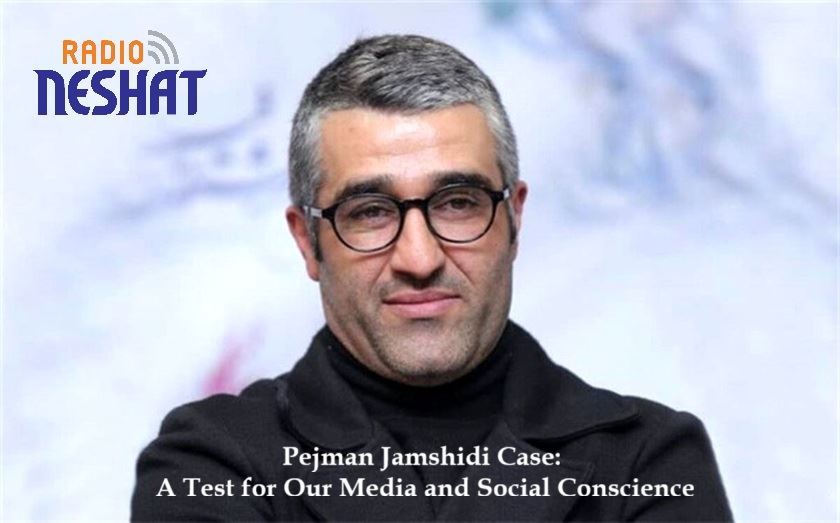پرونده جمشیدی؛ آزمونی برای وجدان رسانهای و اجتماعی ما

پیش از آنکه قاضی رأی دهد، جامعه قضاوت کرد. ماجرای پژمان جمشیدی یادآور مرزی باریک میان خبر، شایعه و اخلاق است.
نویسنده: مسعود ظهوری (Masoud Zoohori)
رادیو نشاط – استرالیا
رسانههای داخلی ایران در روزهای اخیر با انتشار خبر بازداشت یک بازیگر به اتهام «آدمربایی و تجاوز به عنف» پرداختهاند که براساس گزارشها، شاکی خصوصی دارد و بازداشت موقت برای وی صادر شده است. برخی از رسانهها نام و تصویر پژمان جمشیدی را نیز منتشر کردهاند و نوشتند احتمالاً وی در واحد ۳ زندان زندان قزلحصار نگهداری میشود.
مطابق اصل ۳۷ قانون اساسی ایران و ماده ۴ آیین دادرسی کیفری، تا صدور حکم قطعی، متهم مجرم محسوب نمیشود. با این حال، انتشار سریع نام و تصویر جمشیدی در رسانهها و شبکههای اجتماعی، موجب یک محاکمه عمومی پیش از حکم شده است. از سوی دیگر، مأموران پلیس اعلام کردهاند که در بازداشت این فرد نقشی نداشتهاند و موضوع در مرجع قضایی پیگیری شده است.
رسانههای داخلی که نام بردهاند، با انتشار جزییات محل نگهداری، شائبه «اعلام حکم قبل از دادگاه» را تقویت کردهاند. همزمان، رسانههای تحلیلی به موضوع «قربانینکوهی»، قدرت چهرههای مشهور و اختلال در ادراک عدالت عمومی پرداختهاند.
واکنشها
وزارت ارشاد اعلام کرده که شاکی خصوصی مطرح است و مسیر قضایی در جریان است.
رسانههای داخلی متفاوت عمل کردهاند: برخی نام را منتشر و برخی از خط رسمی بینام تبعیت کردهاند.
تحلیلگران حقوقی تاکید دارند که «صدور قرار بازداشت موقت» به معنای اثبات تجاوز به عنف نیست، بلکه روند تحقیق را نشان میدهد.
فعالان حقوق زنان از موج قضاوت سریع در فضای مجازی و «قربانینکوهی» در مقابل شکایتکنندگان انتقاد کردهاند.
پرونده جمشیدی بیش از آن که صرفاً یک پرونده قضایی باشد، یک تست بزرگ برای وجدان رسانهای و اجتماعی ماست. اینکه چگونه با چهره ای مشهور برخورد کنیم، چگونه میان آزادی بیان و احترام به حق متهم، تعادل برقرار کنیم، و اینکه چگونه فرهنگ «قربانینکوهی» را میشکنیم.
در شرایطی که رسانه نام و تصویر را بدون حکم قطعی منتشر میکند، و جامعه پیش از قاضی داوری میکند، اخلاق رسانهای دچار چالش است. اهمیت دارد که تا پایان روند قضایی، سکوت حرفهای و احترام به حریم افراد حفظ شود — چه متهم، چه شاکی.
---------------------
Pejman Jamshidi Case: A Test for Our Media and Social Conscience
Before the judge delivers a verdict, society has already ruled.
The case of Pejman Jamshidi reveals a fragile boundary between news, rumor, and ethics.
By Masoud Zoohori
Radio Neshat – Australia
In recent days, Iranian media have reported on the arrest of a well-known actor on charges of kidnapping and rape. According to these reports, the case involves a private complainant, and a temporary detention order has been issued. Several outlets have identified the actor as Pejman Jamshidi, claiming he is being held in Ward 3 of Ghezel Hesar Prison.
According to Article 37 of Iran’s Constitution and Article 4 of the Criminal Procedure Code, a defendant is presumed innocent until a final court ruling is issued. Yet the rapid publication of Jamshidi’s name and photo by media and social networks has led to what many observers call a public trial before the verdict. Meanwhile, Tehran police have stated that they played no role in the arrest and that the matter is being handled directly by the judiciary.
Some domestic outlets that revealed his identity and alleged place of detention effectively fueled speculation that a judgment had already been made. Analytical and independent media, however, focused instead on broader themes—victim-blaming, the influence of celebrity power, and how such dynamics distort public perceptions of justice.
Reactions
-
Ministry of Culture: confirmed that the case involves a private complaint and that legal proceedings are ongoing.
-
Media responses: divided—some refrained from naming the actor, while others published full identification, blurring ethical lines.
-
Legal analysts: emphasized that a temporary detention order does not equal proof of guilt; it merely marks an investigative phase.
-
Women’s-rights activists: criticized the rush to judgment on social media and condemned the “victim-blaming” culture directed at complainants.
The Jamshidi case is more than a criminal investigation—it is a test of our collective moral and media conscience. It challenges us to ask how we treat public figures, how we balance freedom of information with respect for individual rights, and how we confront a culture that shames victims instead of listening to them.
When the media publish names and images before a verdict, and when society judges before the court does, ethical journalism is at risk. Until the judicial process concludes, maintaining professional restraint and respecting personal privacy—of both the accused and the complainant—remains the minimum standard for a responsible, civilized society.

